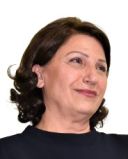Trauma
How Supporting Others Helps the Displaced Gain Resiliency
How to train social workers who themselves have faced displacement.
Posted August 6, 2024 Reviewed by Gary Drevitch

In a scene that plays out in nearly every household worldwide, a mother scurries to gather her family and get on the road to their destination. But this time, it's not to visit grandma, take a nature walk, or even get to school. This is September 2023 in the disputed region of Nagorno-Karabakh, and Svetlana is frantically urging her family of seven to flee the relentless shelling from the neighboring republic of Azerbaijan.
The family fled on foot, leaving behind nearly everything they owned, from their cat to their kettle. As they sought refuge among nearby trees, attacks rained down on their home. In an instant, they lost their house, careers, relationships, and lives they had built in the once bustling capital of the breakaway republic of Artsakh.
And this isn’t her the first time she has been forced to leave her home.
When she was a child and living in Baky, Azerbaijan back in 1990, Svetlana and her family had to move from Baky to Artsakh as Azeris started to kill Armenians living there. She never saw her grandmother or father again. Later she would learn her grandmother was killed.
The Global Displacement Crisis
Globally, more than 117 million people have been displaced due to poverty, food instability, and natural disasters. This staggering statistic represents 1 in every 70 people in the world. A disproportionate number of these are women and children displaced by war and conflict. This is the case for Svetlana and hundreds of other people from Artsakh, but it could just as easily be Sudan, Central America, Ukraine, or the Middle East.
In the wake of an Artsakh torn apart by war, the Fund for Armenian Relief (FAR) launched a project in 2021 aimed at establishing a social services system where none previously existed. With many families returning to Artsakh after the ceasefire without a systematic support network to lean on, this infrastructure was desperately needed to help them rebuild their disrupted lives, connect with resources, and find solutions to their complex problems and needs. The role of FAR in this endeavor is crucial, and represents a beacon of hope for these families.
One of FAR's first steps was establishing a network of competent and qualified social workers. Working closely with the Artsakh government, they offered training opportunities to enhance and strengthen the skills of social-work paraprofessionals so they could better provide support services to the people of Artsakh.
The Therapeutic Benefits of Helping Others
Helping others can be a profoundly therapeutic experience. Numerous studies have shown that engaging in acts of kindness and service can improve mental health, reduce symptoms of depression and anxiety, and enhance overall wellbeing. For migrants and displaced individuals, who often experience severe trauma and loss, these benefits can be particularly impactful. The benefits of altruistic behavior in trauma recovery include the sense of purpose and meaning that comes from helping others, the development of social connections, and distraction from one's own troubles.
Training for Impact
Svetlana was one of 25 participants selected for the nine-month "Introduction to Social Work Training Program," which included practical training opportunities and follow-up coursework to enhance their competency in the field. The program had a profound impact on the participants, equipping them with the skills and knowledge to assess the needs of Artsakh families and ensure that their children's rights were safeguarded. They then focused on issues such as mental health support, domestic abuse, and forced displacement.
For Svetlana, channeling the pain experienced by her and her family has motivated her to assist others. Today, she finds herself in the fulfilling realm of social work, offering a lifeline to 35 displaced families in Martuni, Armenia, who rely on her unwavering support, hope, and resilience: "My phone is on 24/7. Sometimes, people drop me a call or a text just to say hi or dive into a quick chat. It's not just casual banter; it's a kind of psychological support they urgently crave. They confide in me because I'm one of them; I get what they've been through."
Enhancing Self-Esteem and Empowerment
Trauma often leaves individuals feeling powerless and vulnerable. Helping others can restore a sense of agency and control, enhancing self-esteem and empowerment. When migrants and displaced individuals see the positive impact of their actions, it reinforces their sense of worth and capability.
Research by the American Psychological Association (APA) indicates that altruistic behavior is associated with increased self-esteem and a stronger sense of personal empowerment. This empowerment is crucial for overcoming trauma, as it helps individuals rebuild their lives with confidence and resilience. It is a testament to the human spirit and demonstrates the ability to rise above adversity and find strength in helping others.
"I miss Artsakh a lot," Svetlana says. "The memory of strolling down Pyatachok Street in Stepanakert during summer lingers in my heart. However, I am resilient and optimistic, hoping to find solace here in Martuni, Armenia."
Building Resiliency and Reversing “Trickle Down Trauma”
Healing from trauma is multifaceted and complex, but helping others can be a powerful catalyst for recovery. For migrants and displaced individuals, engaging in acts of service offers a path to rebuild their lives, regain a sense of purpose, and reconnect with their communities.
Svetlana is one of 13 members of the program's first class of 25 who have found full-time employment as social workers throughout various regions of Armenia. Two other classes have completed the program since, bringing the total to 58, 35 of whom are full-time social workers who offer crucial support and counseling to locals and fellow displaced people from Artsakh.
"Fortunately, getting this job with the help of FAR’s Child Protection Center has transformed my overall outlook from negativity to positivity. Although I am frequently overwhelmed, I've regained my sense of productivity and confidence, and I am now able to make a meaningful impact on the lives of other displaced people and families as well. Together with my colleagues from Artsakh, we are supported by Armenian Association of Social Workers and participate in group therapy twice a month at FAR’s Children's Protection Center."
By promoting opportunities for altruistic behavior, we can help these individuals survive and develop the resiliency to thrive in their new environments. Ultimately, this helps stem the tide of trickle-down generational trauma to ensure a better and healthier future for displaced families.




